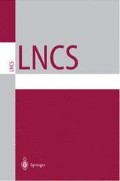Abstract
Tracking detectors in high-energy physics experiments produce hundreds of megabytes of data at a rate of several hundred Hz. Processing this data at a bandwidth of 10-20 Gbyte/sec requires parallel computing. Reducing the huge data rate to a manageable amount by realtime data compression and pattern recognition techniques is the prime task. Clustered SMP (Symmetric Multi-Processor) nodes, based on off-the-shelf PCs and connected by a high bandwidth, low latency network, provide the necessary computing power. Such a system can easily be interfaced to the front-end electronics of the detectors via the internal PCI-bus. Data compression techniques like vector quantization and data modeling and fast transformations like conformal mapping or the adaptive, generalized Hough-transform for feature extraction are the methods of choice.
Access this chapter
Tax calculation will be finalised at checkout
Purchases are for personal use only
Preview
Unable to display preview. Download preview PDF.
References
M. Arregui et al. (ALICE Collaboration), The ALICE DAQ: current status and future challenges, Proceedings CHEP2000, (2000), to be published.
A. Ljubicic, Jr. et al., Design and Implementation of the STAR Experiment’s DAQ, 10th IEEE Real Time Conference, 9/22-26/97, Beaune, France.
C. Adler et al., The proposed Level-3 Trigger System for STAR, subm. to IEEE Transactions in Nuclear Science (1999).
T. Steinbeck, L3 Developments, ALICE DAQ meeting, CERN, (March 16, 2000).
Shannon, C.E., Mathematical theory of communication, Bell System Technical Journal, 27 (1948) 379–423.
D.A. Huffman, A method for the construction of minimum-redundancy codes, Proceedings of the IRE, Vol. 40, No. 9, (1952) 1098–1101.
H. Beker and M. Schindler, Data compression on zero suppressed High Energy Physics Data, Institute of Computer Graphics, Technical University Vienna (1997).
Gray, R. M., Vector Quantization, IEEE ASSP Magazine April (1984) 4.
Linde, Y., Buzo, A, and Gray, R. M., An algorithm for vector quantizer design, IEEE Transactions on Communications 28 (1980) 84.
P. Yepes, A Fast Track Pattern Recognition, STAR Note 248 (1996); Nucl. Instrum. Meth. A380 (1996) 582.
D. Brinkmann et al., Nucl. Instrum. Meth. A354 (1995) 419.
F. Pühlhofer, D. Röhrich, R. Keidel, Nucl. Instrum. Meth. A263 (1988) 360.
Author information
Authors and Affiliations
Editor information
Editors and Affiliations
Rights and permissions
Copyright information
© 2001 Springer-Verlag Berlin Heidelberg
About this paper
Cite this paper
Adler, C. et al. (2001). From the Big Bang to Massive Data Flow: Parallel Computing in High Energy Physics Experiments. In: Sørevik, T., Manne, F., Gebremedhin, A.H., Moe, R. (eds) Applied Parallel Computing. New Paradigms for HPC in Industry and Academia. PARA 2000. Lecture Notes in Computer Science, vol 1947. Springer, Berlin, Heidelberg. https://doi.org/10.1007/3-540-70734-4_39
Download citation
DOI: https://doi.org/10.1007/3-540-70734-4_39
Published:
Publisher Name: Springer, Berlin, Heidelberg
Print ISBN: 978-3-540-41729-3
Online ISBN: 978-3-540-70734-9
eBook Packages: Springer Book Archive

